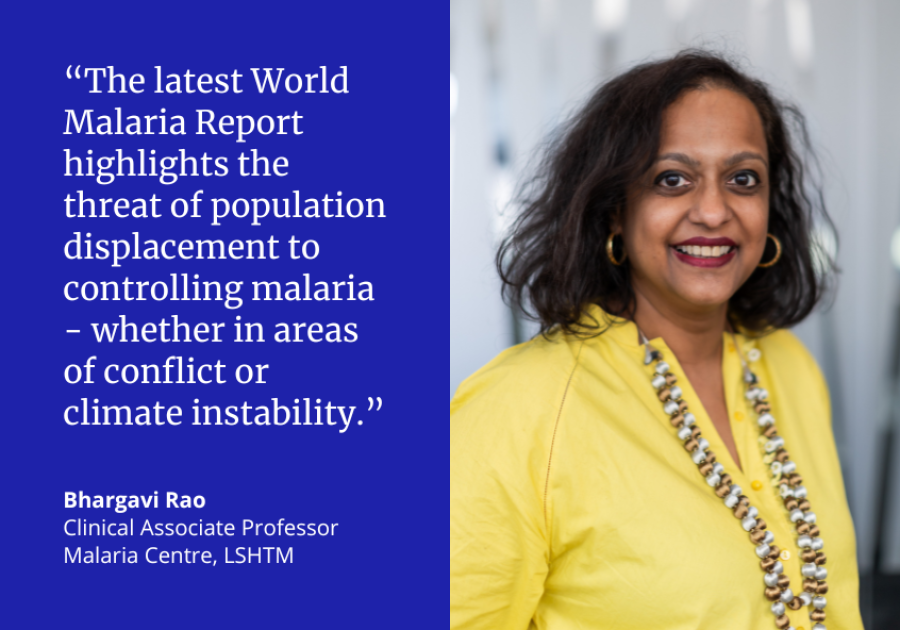Expert Comment - World Malaria Report 2024
11 December 2024 London School of Hygiene & Tropical Medicine London School of Hygiene & Tropical Medicine https://lshtm.ac.uk/themes/custom/lshtm/images/lshtm-logo-black.png
While there has been significant progress in malaria control across the globe, persistent challenges still remain including rising drug resistance, population displacement and emerging zoonotic threats, according to the World Malaria Report 2024 published by the World Health Organization (WHO).
The latest figures reveal that while 2.2 billion cases and 12.7 million deaths have been averted since 2000, malaria remains a significant threat, claiming nearly 600,000 lives in 2023.
Dr Bhargavi Rao, Clinical Associate Professor in Humanitarian Health and the incoming Co-Director of the Malaria Centre at the London School of Hygiene & Tropical Medicine (LSHTM), emphasised the urgent need to understand how malaria behaves in regions affected by conflict and climate instability.
She said: “The latest World Malaria Report highlights the threat of population displacement to controlling malaria - whether in areas of conflict or climate instability. We desperately need to better understand malaria dynamics in these contexts, to better target new and existing interventions for the communities most at need. Anticipatory action will be a critical tool in this battle, including using climate data to predict malaria peaks and outbreaks.”
Dr Roly Gosling, Professor of Global Health at LSHTM, commented on the growing concern of artemisinin resistance, which is spreading across borders particularly in Africa.
He said: “Our investments in malaria control and elimination have saved millions of lives globally, with Africa seeing the greatest benefits. However, as the World Malaria Report highlights, resistance to artemisinin is spreading across borders. This resistance jeopardises the effectiveness of Artemisinin Combination Therapies (ACTs), with parasites surviving longer in patients’ blood. While ACTs remain effective, urgent action is needed to prevent widespread treatment failure.
“The World Malaria Report emphasises the critical need for coordinated regional responses to artemisinin resistance. Countries where resistance is concentrated must be supported with mitigation plans, targeted interventions and progress monitoring. Urgent action in East, Southern, and the Horn of Africa is vital to halt cross-border resistance spread, and sustain malaria control and elimination progress globally.”
The report also underscores worrying trends in countries like Ethiopia, Madagascar, and Pakistan. In Ethiopia, diagnostic resistance, invasive mosquito species and human movement compound the challenges.
Dr Chris Drakeley, Professor of Infection and Immunity at LSHTM, said: “The rising incidence of malaria in Ethiopia, Madagascar, and Pakistan is deeply concerning. In Pakistan, extreme weather events are likely driving this increase, while in Ethiopia and Madagascar, multiple factors are at play. Ethiopia faces diagnostic resistance, drug resistance mutations, and the presence of elusive mosquito species, exacerbated by population movement. These challenges highlight the urgent need for sustained support and innovative control strategies.
“The growing burden of zoonotic malaria (P. knowlesi) in Southeast Asia further complicates elimination efforts. These cases, often tied to land-use changes, demand novel environmental control approaches. Maintaining diagnostic and clinical capacity in areas nearing elimination is crucial, and current definitions of malaria elimination may need revisiting to address this emerging threat.”
The latest World Malaria Report continues the mixed picture of previous years. While global malaria remains concentrated in high-transmission countries grappling with conflict and climate vulnerability, the report also highlights encouraging signs. For example, India, Liberia, and Rwanda have achieved significant case reductions, and Egypt, Africa’s third most populous country, is now malaria-free. The Greater Mekong Subregion is also nearing elimination, despite resistance challenges, and the rollout of new malaria vaccines such as RTS,S and R21 signal progress in vaccination programmes.
However, underserved groups including pregnant women, migrants and Indigenous peoples remain at risk. Rising threats such as drug resistance, invasive species (An. stephensi), and zoonotic malaria (P. knowlesi) jeopardise progress. The report also highlights climate-induced crises like Pakistan’s flooding and sharply increased cases in Ethiopia and Sudan, emphasising the urgency of addressing malaria in fragile contexts.
To address this slowdown in progress amid spiralling threats, the report highlights "The Big Push" framework to coordinate and prioritise access to interventions with a focus on equity, to strengthen political will and to catalyse funding to urgently change the narrative on malaria.
LSHTM's short courses provide opportunities to study specialised topics across a broad range of public and global health fields. From AMR to vaccines, travel medicine to clinical trials, and modelling to malaria, refresh your skills and join one of our short courses today.